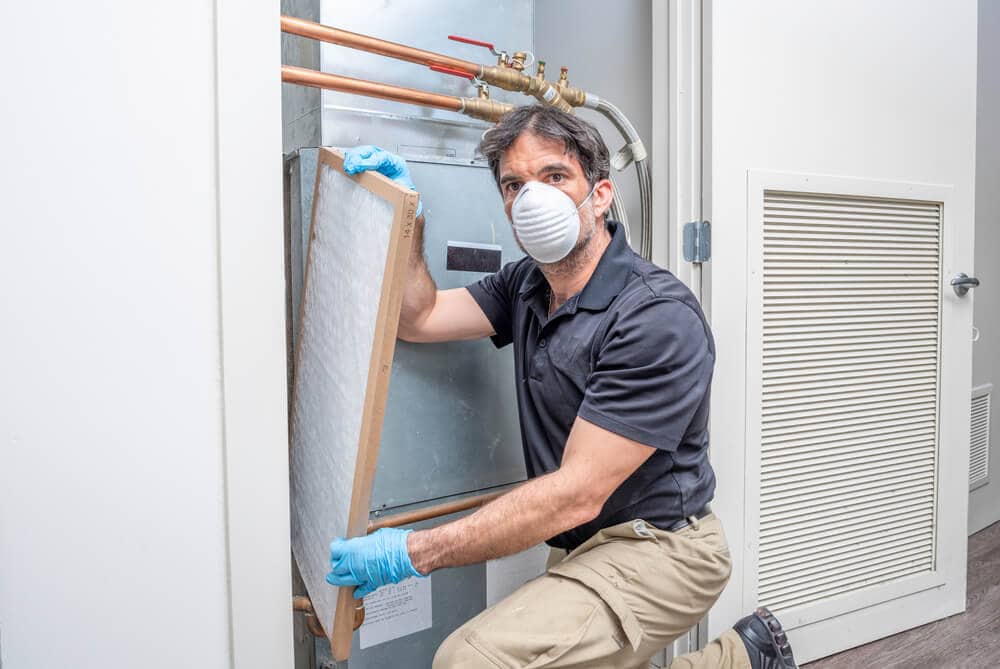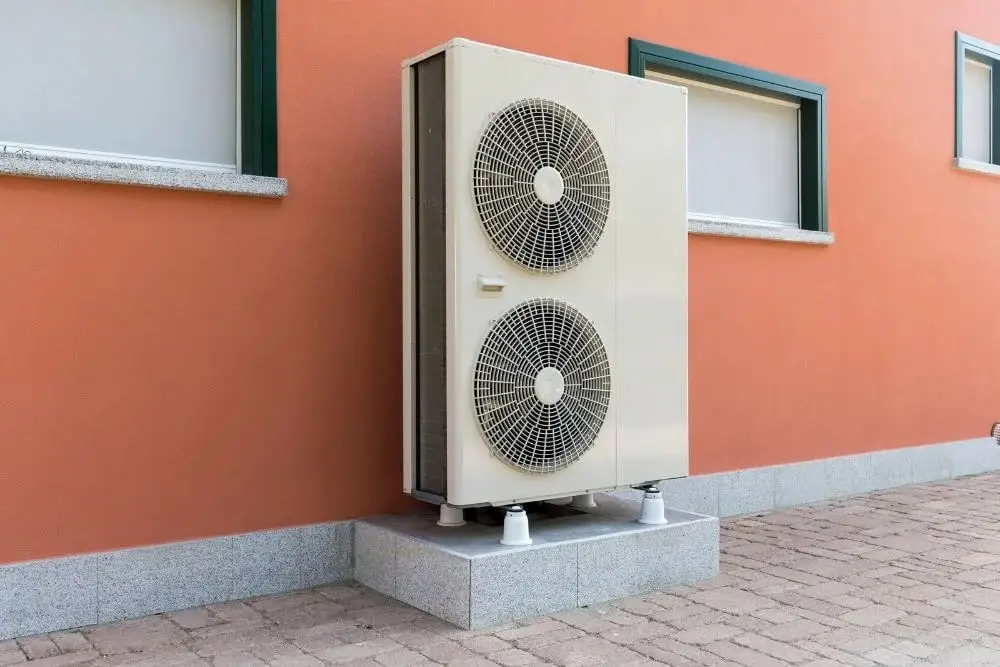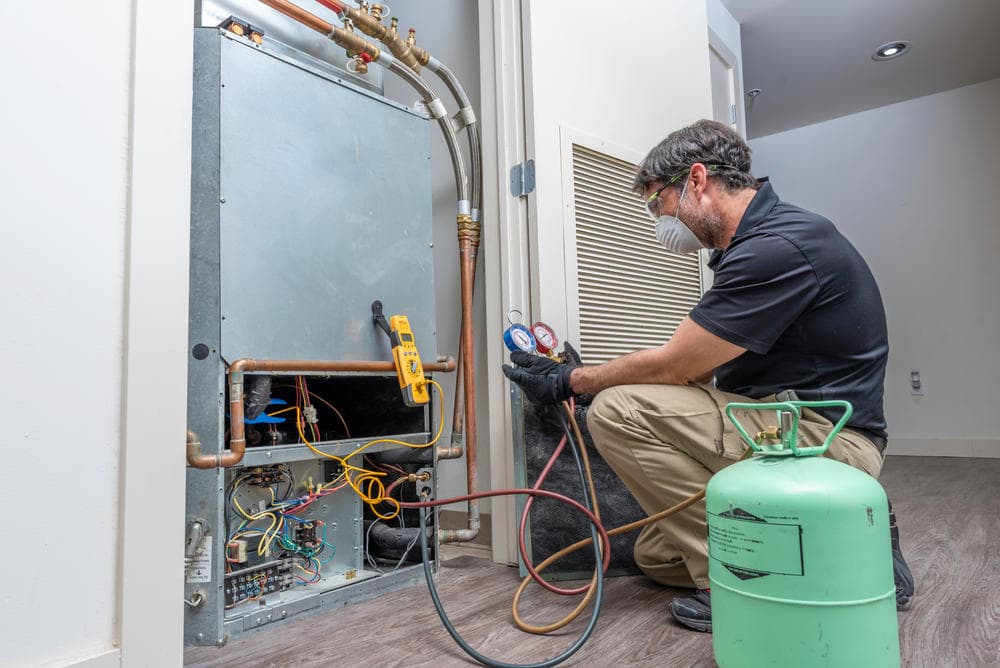Regular heat pump maintenance practices such as cleaning the unit, clearing the space around the outdoor unit, recharging the refrigerant, cleaning or changing air filters are important for ensuring that your heat pump works efficiently and serves you longer.

Photo credit: Rotundahvac.com
The one good thing about most heat pump maintenance requirements is that you can do most of them yourself and only call for service or an HVAC technician's help when the required maintenance is beyond what you can handle.
This article explores some basic heat pump maintenance practices you can follow to ensure you get the best out of your unit for all your heating, cooling, dehumidification, and air conditioning needs.
How Often is Maintenance Required for My Heat Pump?
Your heat pump requires monthly, seasonal, and annual maintenance practices to work efficiently and last a long time, even with regular use. Here are some maintenance activities and how often you should carry them out.
Monthly Heat Pump Maintenance
You should ensure that you do the following maintenance activities on your heat pump at least once a month.
- Cleaning the top of the condensing unit or indoor unit
- Checking the air filters and cleaning them
- If the filters are damaged or too dirty to stay clean for long, consider replacing them with new ones. Ideally, you should change your filters every three to six months.
Seasonal Heat Pump Maintenance
There are two major seasons when your heat pump will come in handy the most.
- In the winter when you need the heat pump for heating, you should always clear debris, snow, weeds, leaves, or any other items on or near the outdoor unit.
Clearing such debris, hairs, leaves, and sticks is important as they might get sucked inside and snug on the fan, causing it to start malfunctioning.
Clearing snow and other debris on or around the outdoor unit also improves aeration for better functionality.
- Just before the summer when you need the heat pump for cooling, you should call in an HVAC professional for routine servicing to ensure every component is working properly.
Annual Heat Pump Maintenance
A heat pump requires routine inspection by a qualified HVAC technician at least once every year. The technician should check for refrigerant leakages, necessary repairs, regular maintenance activities needed, and any replacements that may be required.




Photo credit: Shelf.guide
Heat Pump Maintenance
As mentioned, there are routine heat pump maintenance activities you can do yourself and those that require a professional HVAC technician. Knowing where to draw the line ensures you don't risk the heat pump's efficiency, durability, and warranty.
DIY Maintenance
As a homeowner, you can easily do some maintenance practices even if you have no experience taking care of a heat pump before. The following are some of the activities you can do yourself.
Cleaning the Air Filters
Air filters are easy to access for regular cleaning every month or replacement every three to six months. Clean the air filter by dusting it lightly with a soft, damp cloth. If there is a lot of dirt caked on it, you can use a soft brush to clean it off.
Air filter replacement is easy if the filter is badly damaged, too old, or impossible to clean thoroughly. However, if you are afraid of damaging the filter or other components, feel free to call an HVAC expert.
Cleaning the Top of the Indoor Unit
Most people often forget the top surface of the condensing unit when carrying out maintenance. Cleaning it is easy as you only need a soft, damp cloth to remove dust, hairs, and any other debris.
Clearing the Area Around the Outdoor Unit
The outdoor unit might be in a place where grass and weeds thrive around it. Dust, leaves, garden waste, and other debris may also collect on it.
You should carefully remove such materials to reduce the amount of obstruction they bring and improve the aeration around the heat pump.
You should carefully remove such materials to reduce the amount of obstruction they bring and improve the aeration around the heat pump.
If any debris gets into the unit, you can open the casing to remove it. At this point, you should have the unit switched off to avoid potential accidents that may occur if you slip or if the debris is deeply entrenched into the unit.
Clearing Snow on the Outdoor Unit During Winter
Since snow is cold and usually hardens on the surfaces of the outdoor unit, ensure you wear gloves to protect yourself from the extreme cold.
Hardened snow may be difficult to remove with bare hands. As such, use a woody stick to dig into it while taking care not to pierce the pump surfaces.
Professional Maintenance
It's essential to call in a professional HVAC technician to do the following maintenance activities on your heat pump.
Checking for Leaks and Refrigerant Recharge
While you might spot refrigerant leakages if you are keen enough, leaks in heat pumps are best checked by a professional to determine the exact cause. The technician uses sensors to tell where the leak is coming from for easy repair or replacement of faulty parts.
Leakages necessitate a refrigerant recharge, which you can't do yourself because it requires an expert with a valid refrigeration practice license.
The good thing with refrigerant leaks is that they are quite rare, and you won't need to recharge soon.
Annual Heat Pump Inspection and Servicing
A qualified HVAC professional should do routine annual heat pump inspection since they are best equipped to know how to check the entire system and the individual components for repairs, regular maintenance needs, and replacements.
The technician will advise you accordingly if there are any repairs or parts that need replacing.
Checking and Repairing the Electrical Circuit
Sometimes your heat pump may develop power issues itself. If you note that your heat pump keeps tripping its circuit breakers, it might have an underlying electrical problem that requires an HVAC professional to check and repair.
Signs Your Heat Pump Needs Service
There are signs that you may observe and tell that your heat pump is working less efficiently and thus requires maintenance.
Decreased Performance
If your heat pump suddenly reduces productivity and fails to adequately heat or cool when you set it to do these tasks, it's time to check what routine servicing requires.
You can try to determine the cause of the reduced performance yourself by checking the thermostat settings, power supply, airflow, refrigeration issues, condition of the valves, and the cleanliness of crucial parts like the coils and air filters.
If you do the troubleshooting and the correct fixes and your heat pump still works less efficiently, consider calling in a professional technician to check the system and advise you further.




Photo credit: Mylocalservices.com
Poor Airflow
Reduced airflow could point to a blockage of air within the system due to caked dirt and trapped debris on the fan, coils, air filters, or vents. You can check the system and clean the necessary parts. If the airflow does not improve after this, an HVAC professional can help.
Increased Noise Levels
An increase in the amount of noise from a heat pump can signify that it is working less efficiently or struggling to reach optimum efficiency. You may notice the increase in noise if the fan becomes louder when it overworks to attain optimal cooling or heating.
You can check if the fan has any debris caught on it that requires removing. Sometimes, clogged air filters may also cause the pump to overwork as it tries to force the air through the narrow filter spaces.
If you clean the fan and filter and the pump still has high noise levels, it's time to seek the help of an expert HVAC contractor.
Conclusion
Most heat pump maintenance activities, such as cleaning filters and clearing debris around the outdoor unit are easy, and you can easily do them yourself.
However, you will need the assistance of a qualified HVAC technician for complex services such as refrigerant recharge and part replacements.
You can carry out routine heat pump maintenance every month, seasonally, or annually. But checking for signs that indicate reduced efficiency is a continuous and spontaneous process since you can easily tell when the pump stops cooling or heating as expected.
People Also Ask
As a new user or an accustomed one, you may have burning questions regarding heat pump maintenance. Let's tackle some of the most common questions on the topic from both new and regular users.
How Much Does It Cost To Service a Heat Pump?
Servicing a heat pump will set you back between as low as below $50 and as much as $2,000. The cost depends on what kind of servicing your system requires and how much the HVAC technician charges.
If you need to replace parts, the cost rises based on the part and the complexity of replacing it.
The technician might charge you more if your system is difficult to access due to space limitations in places like New York or obstructions around the outdoor unit (you will be charged more to account for the time the technician takes clearing the space.)
Should I Use the Auto Clean Function?
You can use the auto-clean function on your heat pump, but there are limits and disadvantages.
While the system may get rid of tiny dust particles on its own, it's impossible to remove large unwanted items like pet hair, leaves, or lint. You still have to remove such debris manually.
Do Heat Pumps Need To Be Cleaned?
Like other HVAC appliances, heat pumps need cleaning to operate efficiently and last longer, even with daily use. However, some parts require careful cleaning since they are electrical and should not come into contact with water.
